The Netherlands would prefer not to send a penny to Afghanistan if it cannot be ruled out that the Taliban would benefit from it in any way. The disastrous consequences of this position for socio-economic rights, such as the right to food, have not been taken into account.
Looking at the public debate in the Netherlands, a certain “Afghanistan fatigue” set in more than a decade ago. With the Russian invasion of Ukraine, however, the country has fallen completely off the political radar. The House of Representatives (Tweede Kamer) did debate the mistakes made during the chaotic evacuation last year and is still waiting for the results of three ongoing evaluations1. The Afghans themselves, however, are not likely to benefit from these endeavours.
Apart from these evaluations, the Netherlands should also think about its future role in Afghanistan. This can be seen as a moral responsibility, but also as a matter of self-interest. After all, simply ignoring the country is not an option; if not for moral considerations, then at least because of two of the biggest fears driving a majority of Dutch politicians: irregular migration2 and terrorism.
The primacy of human rights
There is a better reason not to turn our backs on Afghanistan: human rights. For decades, the protection and promotion of human rights has been central to Dutch foreign policy, at least in discourse. To substantiate the credibility of this commitment, we cannot look away from the gross human rights violations that are happening in a country where, until recently, we were so closely involved.
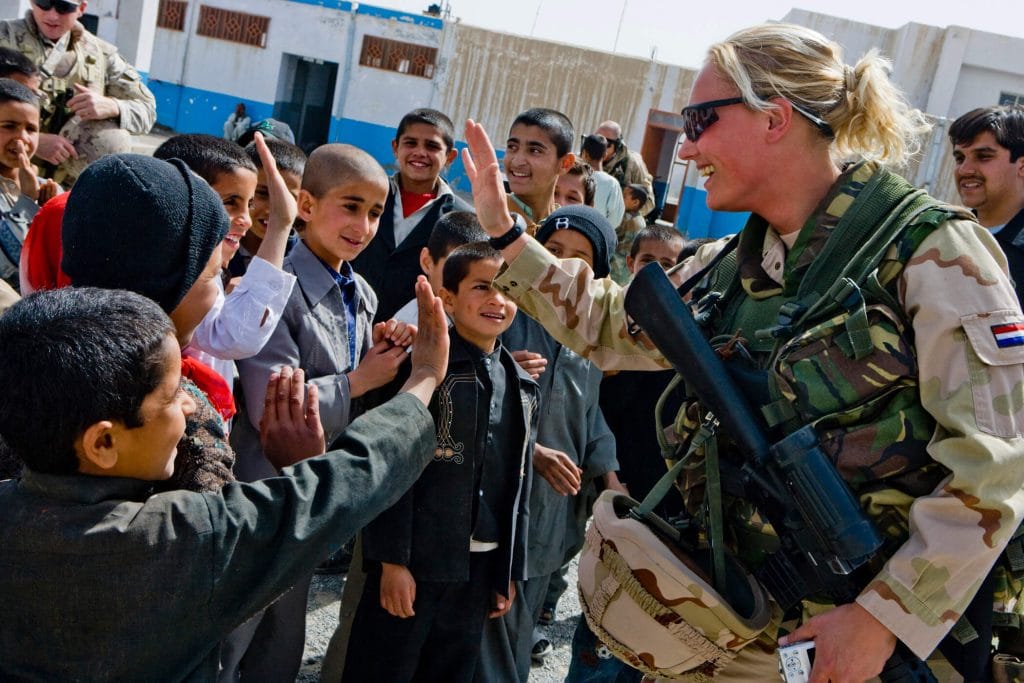
The prevailing narrative is straightforward. The Taliban are human rights violators of the highest order; to promote human rights from the Netherlands we have to distance ourselves from this group as much as we can. By means of sanctions and international isolation we must try to get the Taliban to adopt a more respectful policy.
Broadly speaking this has been the response of the West to the Taliban takeover. When they came to power, existing sanctions against the Taliban effectively became sanctions against Afghanistan as a country.3 Aid was cut off overnight; the central bank’s foreign assets were frozen.
According to the United Nations World Food Programme, as much as 95% of households do not have enough to eat
Yet, in recent months, precisely these decisions have led to an enormous hunger crisis and, with that, to a violation of the right to food. In response, the West is offering humanitarian aid to alleviate the worst consequences – a mere band-aid solution.
The current situation: aid cut-off and sanctions lead to socio-economic catastrophe
Despite a series of attacks by Islamic State, it can be argued that the overall security situation in Afghanistan is better than it has been for a long time, with fewer civilian casualties. Beyond that, however, there is little positive news. Taliban opponents are being murdered, women’s rights are increasingly restricted and the socio-economic situation is catastrophic.
According to the United Nations World Food Programme, as much as 95% of households do not have enough to eat.4 In fact, half of the population, 23 million people, are currently experiencing acute food insecurity. Nearly 5 million children and pregnant women are at risk of malnutrition and every day there are children dying of starvation.
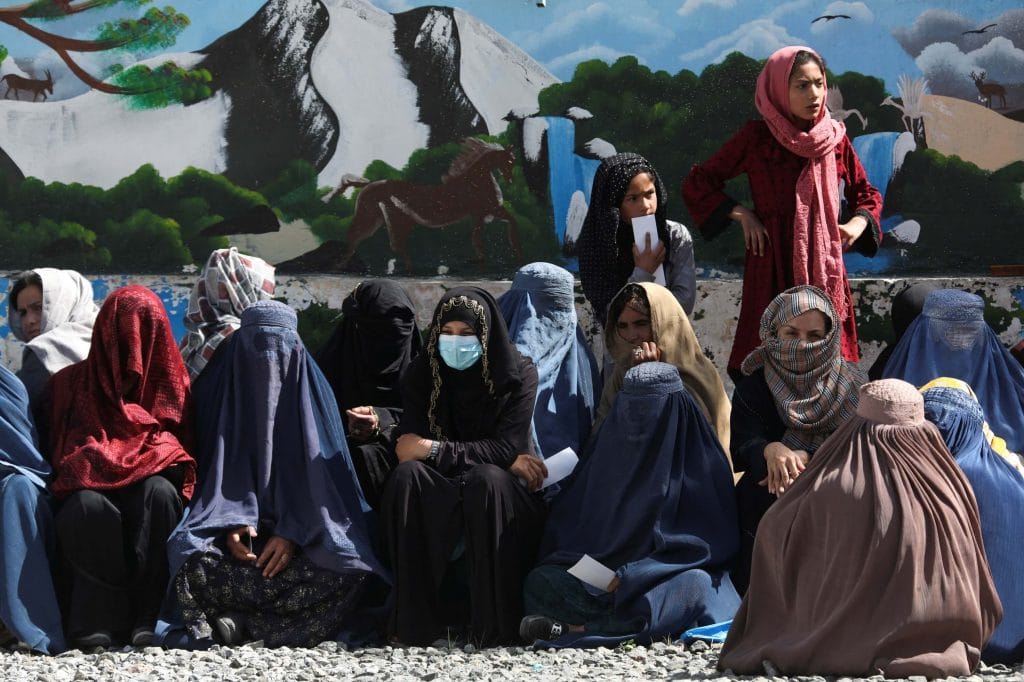
We are, unfortunately, used to encountering such dramatic statistics in areas facing natural disasters, such as prolonged droughts, or in conflict zones, when farmers cannot grow food and supply chains grind to a halt. Yet, although the conflict in Afghanistan has never completely disappeared and parts of the country are suffering from drought, these are not the main reasons for the current food crisis. The main reasons are economic.
Until August 2021, the Afghan economy was extremely aid-dependent. External aid accounted for 40% of gross domestic product and 75% of government expenditure. Because of the abrupt stop of all aid money, the country plunged into an economic abyss.
Most salaries of public sector employees were paid using aid funds. Without that support, purchasing power has plummeted, and the Afghan private sector has suffered greatly as a result. The World Bank found that 87% of Afghans saw their incomes drop significantly.5
The hunger crisis (…) was mainly due to the collapse of the Afghan economy, caused to a large extent by the international response to the Taliban take-over
We must also consider the additional effects of the sanctions against the Taliban. The foreign reserves of the Afghan central bank – located mainly in the United States and Europe – were frozen. Furthermore, international banks were no longer willing to facilitate transactions to Afghan banks for fear of violating the sanctions. As a result, organising emergency aid has become extremely difficult, even for the United Nations.
Afghanistan’s international trade has also taken a beating. The country exports very little; in recent years, imports were ten times larger than exports. The enormous current account deficit was financed with aid inflows. Without those inflows and without access to the accumulated reserves, Afghanistan cannot obtain foreign currency, resulting in an immediate and drastic contraction of imports.
The interruption of external financial flows forced Afghan banks to restrict withdrawals – also in local currency – in order to avert a banking crisis. Thus, the whole financial system came to a standstill.
The hunger crisis must be understood in this context. It is mainly the result of the collapse of the Afghan economy, to a large extent caused by the international response to the Taliban’s seizure of power.6
What is the aim of this tough economic line?
This raises the question of what the international community is aiming to achieve. Besides the wishful thinking that the Taliban regime would quickly fall apart, the idea was that economic pressure could push the Taliban towards a more inclusive government with at least a minimum protection of human rights and the position of women. By cutting off all aid, a proverbial carrot was created, ready to be offered to the regime in exchange for concessions.
Unfortunately it was to no avail. Despite the dramatic economic situation, the Taliban announced in March 2022 that secondary schools would remain closed for girls. In a further move drastically curtailing the freedom of women to move around in public, the Taliban recently ordered all women to wear a full face veil.
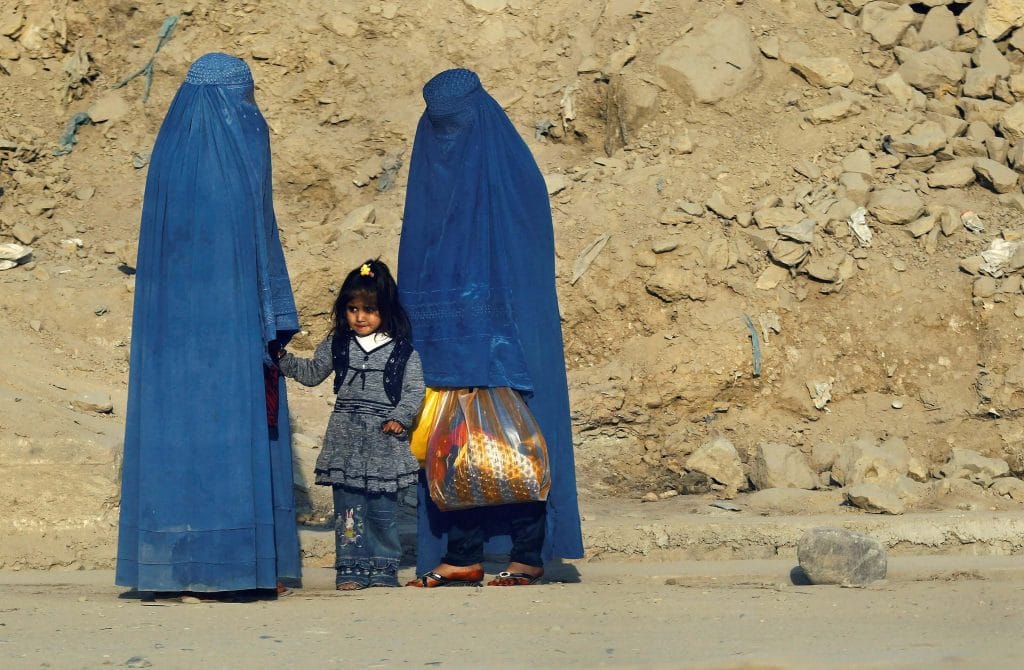
How can we explain these developments? First of all, external economic pressure tends to have very limited effects on the decision-making of hostile regimes. Historian Nicholas Mulder, who recently published a book on the history of sanctions[i], stresses that they are only effective if it is very clear under what realistic conditions they will be lifted, and if they are accompanied by diplomatic efforts to realise those conditions.7
With regards to the situation in Afghanistan, this has not happened. There are hardly any diplomatic contacts with the Taliban and, as far as we know, there have been no clear negotiations on particular sanctions that would be lifted in exchange for specific concessions.
Reliable estimates for the recent Afghan food crisis are not yet available, but it is clear that many thousands of lives have been lost.
The effect of economic sanctions on the Taliban’s decision-making was therefore highly uncertain from the outset; the dramatic effects for the Afghan population, by contrast, were not. Mulder emphasises that sanctions generally lead to an increase in poverty and inequality, with – certainly in developing countries – disastrous results. In the 1990s, for example, hundreds of thousands of children in Iraq and Haiti died as a result of sanctions.
Reliable estimates for the most recent Afghan food crisis are not yet available, but it is clear that many thousands of lives have been lost. If this scenario could already be predicted with reasonable certainty in August 2021, why did it receive so little attention?
A broader human rights perspective
When talking about human rights, civil and political rights – embedded in the 1948 Universal Declaration of Human Rights – are usually the first to come to mind.8 However, that same declaration forms the foundation of various other human rights treaties, such as the International Covenant on Economic, Social and Cultural Rights, which also includes the right to food. Although of equal legal status and inseparable from civil and political rights, the fundamental social rights generally receive much less attention in public debate and policy.
It is this disbalance that underpins the Western position vis-à-vis Afghanistan. The Taliban and political or civil rights; the gap between the two is of such magnitude that opting for the toughest line possible towards the new rulers seemed like the obvious course of action. The political climate in the West was one of ‘not a penny to Afghanistan if we cannot completely rule out that the Taliban can benefit in any way’. The disastrous consequences of this attitude for socio-economic rights, such as the right to food, were not taken into consideration.
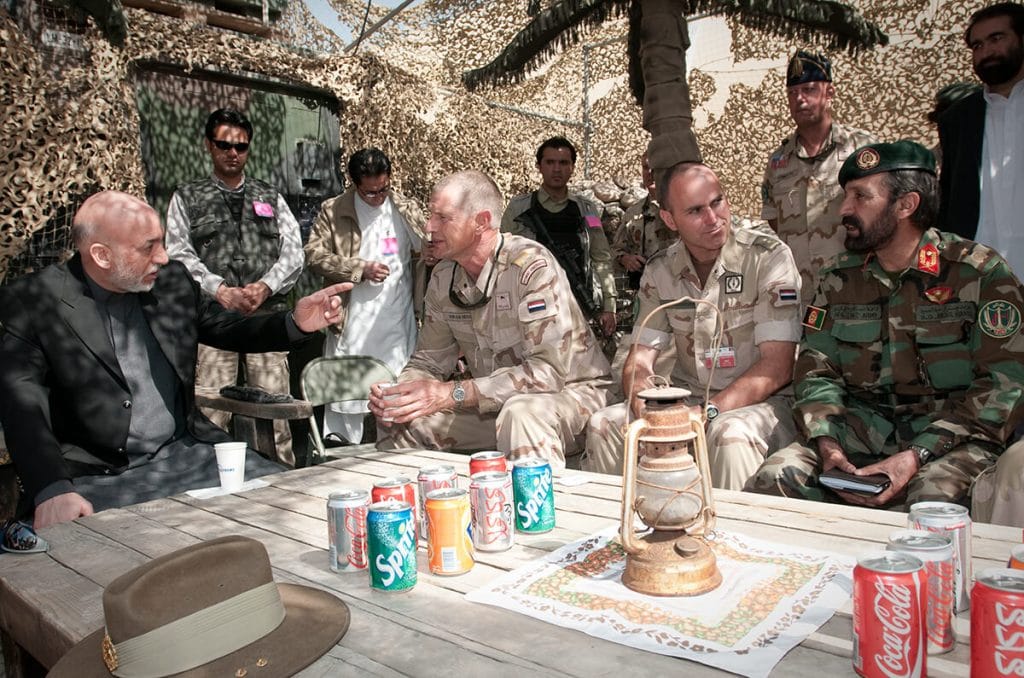
This is also problematic from a constitutional point of view. The Dutch Constitution contains the obligation to promote the international legal order. A massive violation of the human right to food – as has been the case in Afghanistan in recent months – could be seen as a breach of this order. Therefore, the Netherlands has a constitutional obligation to work towards resolving this crisis.
How to proceed?
The Netherlands does fulfil this duty to some extent, through emergency relief, providing 23.5 million euros in 2021. Additionally, at a donor conference at the end of March 2022, the international community pledged more than 2 billion euros for Afghanistan, of which 25 million euros by the Netherlands.9
Some critical observations can be made, however. First, the amount is not enough, with the UN indicating that more than 4 billion euros in humanitarian aid is needed. Second, the economic situation makes it challenging to spend these funds properly. It is still difficult to get money into the country because international banks do not cooperate for fear of violating sanctions. In addition, without a functioning banking system, it is virtually impossible to provide proper support in close cooperation with local Afghan partners.
The most important point, however, requires us to zoom out a little further. The only sustainable solution to the current humanitarian emergency is a revitalisation of the local Afghan economy, which emergency aid alone cannot accomplish. It also demands financial support for paying public salaries for basic services such as education and health care.
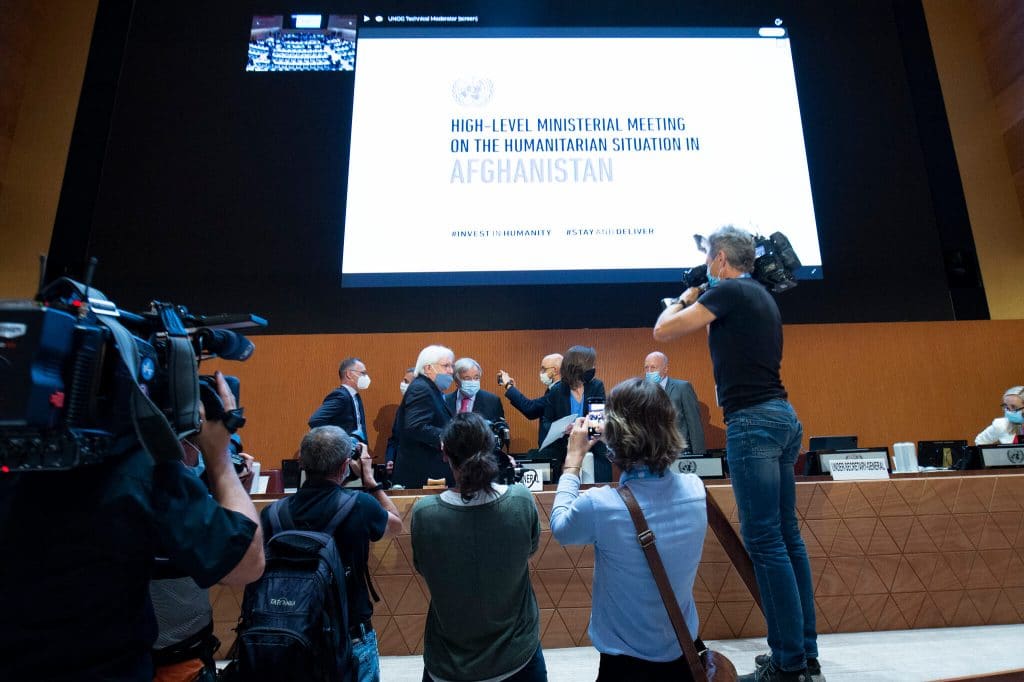
A money injection of this kind could help revive local demand, which in turn would support the local private sector. Additionally, the central bank should be allowed to resume its core functions of monetary and exchange rate policy. Foreign assets should be released, at least in part – especially those of commercial banks. This is also of symbolic importance, signalling to international banks that they can start facilitating financial transactions to Afghan banks without violating Western sanctions.[i]
Cautious steps in this direction were put to a halt by the Taliban’s recent reversal on the issue of girls’ education. The World Bank, for example, was on the verge of releasing money for public salaries, to be spent through the UN rather than the Taliban. This plan is now in jeopardy again; while understandable, it is also unfortunate, as this kind of support would help to relieve the suffering of the Afghan population.
To promote socio-economic human rights in Afghanistan, we will have to talk to the Taliban
Explicitly linking external aid to girls’ education, or women’s rights in general, seems to have counterproductive effects. It is actually strengthening the position of the conservative hardliners and makes it more difficult for more progressive elements of the Taliban to stand up for women’s rights internally, as they could then be dismissed as weaklings who give in to Western pressure.10
By contrast, releasing World Bank funds would be of great importance for primary education, which also benefits hundreds of thousands of girls. Additionally, it would help to restart the local economy, and thus to alleviate some of the humanitarian need.
The importance of an uneasy conversation with the Taliban
The situation that has arisen in Afghanistan following the Taliban takeover is complex and presents the international community with apparent dilemmas about how to balance human rights with other issues. These discussions, however, ignore the fact that many of those other issues are just as much about human rights. In order to take well-informed decisions, therefore, it is very important, as the Advisory Council on International Affairs (AIV) states in a 2019 report, to approach socio-economic issues from a human rights perspective as well.11
When applying economic pressure on human rights abusers such as the Taliban, we need to think strategically about what exactly we want to achieve and take into account possible unintended consequences. This requires a realistic approach and an acknowledgement of the fact that ideal solutions do not exist.
A devilish dilemma lurks in the revitalisation of the local economy
To promote socio-economic human rights in Afghanistan, we will have to talk to the Taliban, even if it feels uncomfortable. The alternative – ignoring the Taliban and isolating them economically, then cushion the worst effects with emergency aid – appears easier but relies on a simplistic reading of the situation. It is highly unlikely that this approach of isolation will lead to behavioural change on the part of the Taliban, while it is certain that the Afghan population will suffer greatly.
That is the uncomfortable reality. There is a devilish dilemma in revitalising the local economy: the more the Taliban is enabled to perform the core functions of government, the more quasi-recognition the regime will enjoy.
Yet, taking the primacy of human rights as point of departure, this dilemma becomes easier to resolve for policymakers. For the time being, it is the only way to ensure that Afghans can have access to food and other basic needs. That is our real priority.
Footnotes
- The IOB, the independent evaluation agency of the Ministry of Foreign Affairs, is currently performing an evaluation of the last mission the Netherlands has contributed to: the Resolute Support Mission. In addition, the NIOD is conducting an investigation into the past twenty years of Dutch involvement. Finally, an independent committee led by Maarten Ruys is investigating the evacuation.
- Irregular migrants do not have valid documents to enter or stay in a country, for example because someone does not have a valid passport or travel document or uses false documents. EU countries avoid using terms like ‘irregular migration’ and ‘illegal migrants’ for this purpose, as it suggests that they refer to something criminal: irregular migration is an administrative violation and not a criminal act. See: European Migration Network Netherlands, ‘Irregular migration’, 2018.
- The Australian Department of Foreign Affairs website contains a snapshot of international sanctions against the Taliban. Australian Government Department of Foreign Affairs and Trade, ‘Snapshot.The Taliban Sanctions Regime‘, August 2019.
- World Food Programme, ‘WFP Afghanistan: Situation Report’, Reliefweb, 4 April 2022.
- World Bank, ‘Afghanistan Welfare Monitoring Survey: Round 1’, Reliefweb, 15 March 2022.
- International Crisis Group, ‘Beyond Emergency Relief: Averting Afghanistan’s Humanitarian Catastrophe’, 6 December 2021; Human Rights Watch, ‘Afghanistan: Economic Roots of the Humanitarian Crisis. Questions and Answers on Human Costs of Sanctions and Banking Restrictions’, 1 March 2022.
- Nicholas Mulder, The Economic Weapon, New Haven: Yale University Press, 2022.
- Rutger van der Hoeven, ‘Het alternatief voor oorlog’, De Groene Amsterdammer, volume 146, nr. 3, 19 January 2022.
- Established in the 1966 Covenant on Civil and Political Rights.
- UN Office for the Coordination of Humanitarian Affairs, ‘Afghanistan Conference 2022 High-level pledging event on supporting the Humanitarian Response in Afghanistan – Financial announcements Last updated: 1 April 2022’, 31 March 2022.
- Although the United States published guidelines in February 2022 which attempt to clarify that facilitating commercial transactions with Afghanistan is possible without violating sanctions, international banks are still very reluctant. This is also known as the ‘chilling effect’ of Western sanctions. Banks are so fearful of violating them that they do not take any risks.
- Ashley Jackson, ‘The Ban on Older Girls’ Education: Taleban conservatives ascendant and a leadership in disarray’, Afghanistan Analysts Network, 29 March 2022.
- Advisory Council on International Affairs [AIV], ‘Duurzame ontwikkelingsdoelen en mensenrechten: Een noodzakelijk verbond’, nr. 110, May 2019.
This article was first published in Dutch on 18 May 2022, in the Clingendael Spectator: https://spectator.clingendael.org/nl/publicatie/harde-sancties-tegen-taliban-ondermijnen-recht-op-voedsel
Translated by Yannicke Goris.
